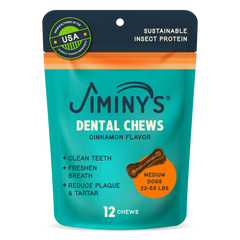It’s important to be aware that not all parasitic infections cause obvious symptoms. Regular vet checkups—including after treating a case of diagnosed worms—are essential for your furry best friend. You and your dog need to know for certain that the parasites have been eradicated.
Dangers of Dog Parasites
If you notice the signs of parasites in or on your dog, you should book an appointment with your vet. The advice given here is for prevention of dog parasites, not treatment. Dog parasites can endanger not only the comfort of your dog, but his or her health.
For example, if your dog contracts parasitic worms, there is an immediate need to treat the infestation. Intestinal worms have the capability of damaging internal organs, including the heart. Roundworms are the most common, but other worms, such as hookworms and tapeworms, are also known to be parasitic to canines.
Types of Dog Parasites are:
| External | Intestinal | Internal |
| Fleas | Coccidia | Heartworms |
| Ticks | Giardia | Lungworms |
| Lice | Hookworms | |
| Mange | Roundworms | |
| Ear Mites | Tapeworms | |
| Whipworms |
Prevention of Dog Parasites
Prevention of dog parasites is easier than treatment after the fact. It’s always best to avoid any danger to your dog’s well-being, and parasites certainly fit that description. To minimize the chances that your canine buddy will fall prey to one or more parasites, try the following:
Clean up Waste in the Yard
All kinds of putrid waste in the yard will attract parasites, including your dog’s droppings. Insects, worms and other parasites view this as fertile ground to lay eggs. Note that thorough cleanup on a frequent basis is important. As old waste settles down into the soil, the parasites find a welcoming habitat in the dirt. Once there, they can happily reside and lay eggs for months on end. Any kind of contact with infected yard waste and/or feces can easily infect your dog.
Read Our Article: Sustainable Pet Waste Removal: What you need to know
Many dog owners find that it’s easier to keep a clean yard by designating a contained area for the dog’s outside “business” needs. It doesn’t have to be hard to designate such an area. Even an area surrounded by natural landmarks, like bushes, trees or flower beds can work as a recognizable area for your dog to get busy. This way, the cleanup area is smaller and more manageable.
Make Brushing a Habit
All dogs should be brushed frequently. Regular brushings, even for short-haired dogs, not only help you keep an eye out for injuries and skin irritations; they also help keep newly arrived parasites from breeding on your dog’s skin.
To make your brushings even more effective, consider dropping or spritzing a bit of essential oil on your dog’s coat or on the brush bristles right before you brush. Certain scents like lemongrass, clove, peppermint and lavender have been shown to repel ticks and fleas. You could even experiment with blending some of the oils to come up with a signature “fragrance” for your dog.

Wash Once a Week
As a dog owner, you know how much the shortest member of your family loves to roll around in the dirt. Watching a dog enjoy himself rolling and wiggling in the dirt or on the grass will put a smile on anyone’s face. But this behavior has a cost, and that is the odor that transfers from the ground to the dog’s fur. It may be subtle or strong, but it’s there. That odor will attract parasites like fleas and and ticks to your dog’s coat. Once there, they will quickly start nesting and proliferating.
The only natural solution to this is to wash your dog at least once a week with a natural-based flea and tick dog shampoo. Since that may feel like a lot to a busy dog lover, there may be some value in getting a little kiddie pool for your dog. If your dog is a water lover, they may joyfully splash around and wash themselves to a point where they get some protection from parasites.
Read Our Article: How to wash a dog with allergies
Enhance Their Water
Fleas are repelled by certain odors, such as vinegar. There is some evidence to suggest that adding a small amount of apple cider vinegar to your dog’s water will help keep certain parasites off of them. You’ll need to experiment with the ratio, but don't go over 50/50. The last thing you want to do is to make your dog’s water distasteful and have him or her avoid drinking it.
Regular Vet Checkups
Remember, using natural solutions at home to help prevent parasitic infections in your dog does not replace professional veterinary care. Always keep your vet informed of what you do at home to keep Fido safe from parasites.
Healthy, well-cared-for dogs are less likely to get parasitic infections than some other dogs. Optimize your dog’s health with wholesome, insect-based dog food. Jiminiy’s wide selection of allergen-free dog food and snacks are ideal for dogs of all kinds!
Frequently Asked Questions About Natural Parasite Prevention for Dogs
1. What are common parasites that affect dogs?
Dogs can be affected by a variety of parasites, including fleas, ticks, intestinal worms (like roundworms and hookworms), and mites. These parasites can cause skin irritation, digestive upset, and other health issues, so prevention is important.
2. Can natural methods help prevent dog parasites?
Yes — natural methods can support parasite prevention, but they should be used thoughtfully and in conjunction with veterinary guidance. Approaches like dietary supplements, grooming, and environmental management help reduce parasite risk.
3. How can diet support parasite prevention?
A nutrient-rich diet that supports immune and digestive health may make a dog’s body less attractive to parasites. Some natural supplements like omega-3 fatty acids or probiotics may bolster overall health and gut function, potentially helping deter parasitic establishment.
4. Do certain foods help repel or prevent parasites?
Some natural foods — like pumpkin seeds — contain compounds thought to help paralyze and expel intestinal worms, and high-fiber foods support digestive health. While these foods can be supportive, they shouldn’t replace veterinary parasite controls.
5. Are natural flea and tick repellents effective?
Certain natural remedies — such as diluted sprays with apple cider vinegar or essential oils (carefully and safely diluted) — can help repel fleas and ticks. Yard management like removing leaf litter and trimming grass also reduces outdoor parasite habitats.
6. Is cleaning the dog’s environment part of parasite prevention?
Absolutely. Keeping bedding clean, vacuuming carpets regularly, and maintaining a tidy yard reduce flea, tick, and parasite egg populations, helping prevent infestations before they start.
7. Can pumpkin seeds alone stop worm infestations?
Pumpkin seeds and similar foods contain compounds that may help expel worms by affecting their mobility, but they do not guarantee full protection and shouldn’t replace routine veterinary parasite checks or preventive medications.
8. Are all “natural” parasite remedies safe for my dog?
Not always. Some herbs and essential oils can be toxic if used incorrectly or at the wrong dose, especially in puppies or dogs with health issues. Always consult your veterinarian before trying natural pest repellents or supplements.
9. Should I still use veterinarian-recommended parasite prevention?
Yes. Natural methods can support your dog’s overall health, but veterinarian-prescribed parasite preventives (like monthly treatments for heartworm, fleas, and ticks) are the most reliable way to protect dogs from dangerous infestations — especially in areas with high parasite risk.
10. When should I see a vet about parasites?
If your dog shows signs like persistent itching, hair loss, digestive distress, visible parasites, or changes in appetite or energy, contact your veterinarian. These symptoms may indicate a parasitic infection that needs professional diagnosis and treatment.





